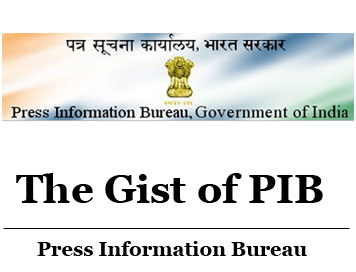(THE GIST OF PIB) Production Linked Incentive Scheme

(THE GIST OF PIB) Production Linked Incentive Scheme
[April-2022]
Production Linked Incentive Scheme
- The Ministry of Textiles has selected 61 applicants under the Production Linked Incentive (PLI) Scheme for Textiles. Government approved Production-Linked Incentive (PLI) Scheme for Textiles products, namely MMF Apparel, MMF Fabrics and Products of Technical Textiles, for enhancing India’s manufacturing capabilities and enhancing exports with an approved financial outlay of Rs 10,683 crore over a five-year period. To further boost the growth of the sector, centre also removed the import duty of cotton.
About:
- The Production Linked Incentive (PLI) aims to give companies incentives on incremental sales from products manufactured in domestic units. Apart from inviting foreign companies to set shop in India, the scheme also aims to encourage local companies to set up or expand existing manufacturing units.
- In April last year, the central government had for the first time notified the PLI scheme for mobile phones and allied component manufacturing.
- As a part of the scheme, companies which set up new mobile and specified equipment manufacturing units or expanded their present units would get incentives of 4 to 6 per cent, after they achieve their investment and production value target for each year.
- Later, the government announced expansion of the PLI scheme to include 13 more sectors such as automobile and automobile components, pharmaceutical drugs, textile products, food products, high efficiency solar photo-voltaic modules, white goods such as air conditioners and LED bulbs, speciality steel products, drones and drone components, etc.
Why is the production linked scheme needed?
- The PLI schemes have been introduced as a key element of the Atma Nirbhar Bharat package to transform the manufacturing landscape of the Indian economy and integrate it into the global supply chains.
- The strategy behind these schemes is to offer companies incentives on incremental sales from products manufactured in India, over the base year.
- They have been specifically designed to boost domestic manufacturing in sunrise and strategic sectors, curb cheaper imports and reduce import bills, improve cost competitiveness of domestically manufactured goods, and enhance domestic capacity and exports.
CLICK HERE TO DOWNLOAD FULL PDF
CLICK HERE TO DOWNLOAD UPSC E-BOOKS
Study Material for UPSC General Studies Pre Cum Mains
Get The Gist 1 Year Subscription Online
Click Here to Download More Free Sample Material
<<Go Back To Main Page
Courtesy: PIB

